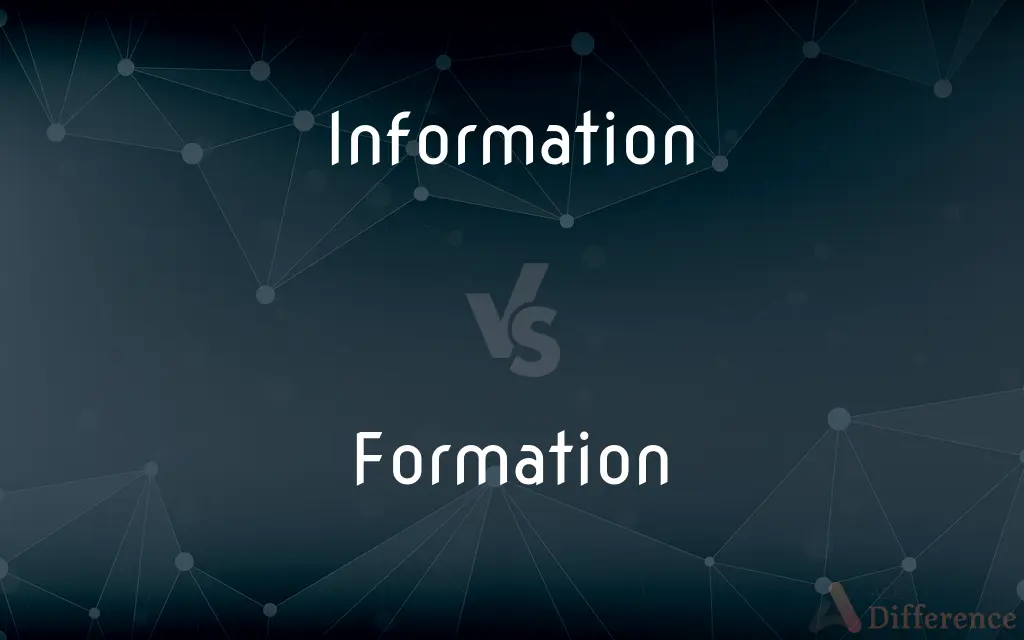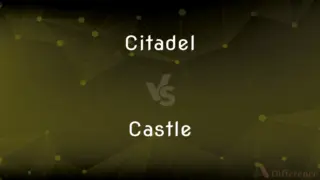Information vs. Formation — What's the Difference?
By Maham Liaqat & Urooj Arif — Updated on March 11, 2024
Information is data processed for understanding; formation is creating or developing structures or patterns.

Difference Between Information and Formation
Table of Contents
ADVERTISEMENT
Key Differences
Information is processed, organized, or structured data that is meaningful and useful for making decisions or understanding a situation. It typically comes in various forms like text, numbers, and images, and is essential in all areas of life for communication and knowledge acquisition. On the other hand, formation refers to the way something is formed or created, encompassing physical, social, or abstract structures. It includes geological formations, military formations, and formations within organizations.
While information is key in the digital age, driving technology and decision-making with data analysis and knowledge dissemination, formation plays a crucial role in the natural world, military strategies, and organizational structures. Information helps us understand and navigate the world, whereas formation often dictates the physical and structural aspects of environments and groups.
Information is dynamic and can change with new data or analysis, reflecting a constant flow of knowledge and insight. Conversely, formations are typically more static, representing a specific arrangement or structure at a given time, though they can evolve.
The value of information lies in its accuracy, relevance, and timeliness, making it a critical asset in decision-making processes. Formation's importance, however, lies in its stability, efficiency, and effectiveness in organizing elements, whether in nature or in human endeavors.
In education and research, information fuels learning and discovery, expanding our understanding of various fields. Formation, in contexts like geology or sociology, provides insight into the processes and structures that shape our world and societies.
ADVERTISEMENT
Comparison Chart
Definition
Processed data meaningful for decisions
Creation or development of structures
Key Feature
Relevance and utility
Structural arrangement
Application
Decision-making, learning
Natural world, military, organizations
Changeability
Dynamic, can be updated
More static, but can evolve
Value
Accuracy, relevance, timeliness
Stability, efficiency, effectiveness
Compare with Definitions
Information
Processed data that is organized for a specific purpose or decision-making.
The weather forecast provides information about tomorrow's weather conditions.
Formation
The natural process of creating rock or land formations.
The canyon was created by the formation of sedimentary rock layers over millions of years.
Information
The content conveyed in conversations, texts, or media.
The report contained vital information about the company's finances.
Formation
The development of social or cultural structures.
The formation of community groups plays a crucial role in local governance.
Information
Knowledge imparted or acquired through study or experience.
The library is a rich source of information on history.
Formation
How a company or institution is organized.
The new CEO restructured the company, introducing a more efficient formation.
Information
The basis for software operations, databases, and communications.
His app collects information from users to personalize the content.
Formation
The arrangement or positioning of players in a team.
The coach decided on a 4-3-3 formation for the upcoming match.
Information
Data analyzed to guide choices in business or personal life.
Market information helps investors decide which stocks to buy.
Formation
A specific arrangement of troops or equipment.
The platoon organized into a defensive formation to better protect the area.
Information
Information can be thought of as the resolution of uncertainty; it answers the question of "What an entity is" and thus defines both its essence and the nature of its characteristics. The concept of information has different meanings in different contexts.
Formation
The act or process of forming something or of taking form.
Information
Knowledge or facts learned, especially about a certain subject or event.
Formation
Something formed
Beautiful cloud formations.
Information
The act of informing or the condition of being informed; communication of knowledge
Safety instructions are provided for the information of our passengers.
Formation
The manner or style in which something is formed; structure
The distinctive formation of the human eye.
Information
(Computers) Processed, stored, or transmitted data.
Formation
A specified arrangement or deployment, as of aircraft, troops, or players on a sports team.
Information
A numerical measure of the uncertainty of an experimental outcome.
Formation
(Geology) A primary unit in the mapping of rock strata, consisting of a set of contemporaneous rocks having the same characteristics and origin.
Information
(Law) A formal accusation of a crime made by a public officer rather than by grand jury indictment in instances in which the offense, if a federal crime, is not a felony or in which the offense, if a state crime, is allowed prosecution in that manner rather than by indictment.
Formation
The act of assembling a group or structure. 14
Information
That which resolves uncertainty; anything that answers the question of "what a given entity is".
Formation
Something possessing structure or form. 17
Information
Things that are or can be known about a given topic; communicable knowledge of something.
I need some more information about this issue.
Formation
The process during which something comes into being and gains its characteristics. 18
Information
The act of informing or imparting knowledge; notification.
For your information, I did this because I wanted to.
Formation
(military) A grouping of military units or smaller formations under a command, such as a brigade, division, wing, etc. 18
Information
A statement of criminal activity brought before a judge or magistrate; in the UK, used to inform a magistrate of an offence and request a warrant; in the US, an accusation brought before a judge without a grand jury indictment.
Formation
(geology) A layer of rock of common origin. 19
Information
(obsolete) The act of informing against someone, passing on incriminating knowledge; accusation.
Formation
(sports) An arrangement of players designed to facilitate certain plays.
Information
The systematic imparting of knowledge; education, training.
Formation
The process of influencing or guiding a person to a deeper understanding of a particular vocation.
Information
The creation of form; the imparting of a given quality or characteristic; forming, animation.
Formation
(category theory) A structure made of two categories, two functors from the first to the second category, and a transformation from one of the functors to the other.
Information
[…] the meaning that a human assigns to data by means of the known conventions used in its representation.
Formation
The act of giving form or shape to anything; a forming; a shaping.
Information
(Christianity) Divine inspiration.
Formation
The manner in which a thing is formed; structure; construction; conformation; form; as, the peculiar formation of the heart.
Information
A service provided by telephone which provides listed telephone numbers of a subscriber.
Formation
A substance formed or deposited.
Information
(information theory) Any unambiguous abstract data, the smallest possible unit being the bit.
Formation
Mineral deposits and rock masses designated with reference to their origin; as, the siliceous formation about geysers; alluvial formations; marine formations.
Information
As contrasted with data, information is processed to extract relevant data.
Formation
The arrangement of a body of troops, as in a square, column, etc.
Information
(information technology) Any ordered sequence of symbols (or signals) (that could contain a message).
Formation
An arrangement of people or things acting as a unit;
A defensive formation
A formation of planes
Information
The act of informing, or communicating knowledge or intelligence.
The active informations of the intellect.
Formation
A particular spatial arrangement
Information
Any fact or set of facts, knowledge, news, or advice, whether communicated by others or obtained by personal study and investigation; any datum that reduces uncertainty about the state of any part of the world; intelligence; knowledge derived from reading, observation, or instruction.
Larger opportunities of information.
He should get some information in the subject he intends to handle.
Formation
The fabrication of something in a particular shape
Information
A proceeding in the nature of a prosecution for some offense against the government, instituted and prosecuted, really or nominally, by some authorized public officer on behalf of the government. It differs from an indictment in criminal cases chiefly in not being based on the finding of a grand jury. See Indictment.
Formation
The act of forming something;
The constitution of a PTA group last year
It was the establishment of his reputation
He still remembers the organization of the club
Information
A measure of the number of possible choices of messages contained in a symbol, signal, transmitted message, or other information-bearing object; it is usually quantified as the negative logarithm of the number of allowed symbols that could be contained in the message; for logarithms to the base 2, the measure corresponds to the unit of information, the hartley, which is log210, or 3.323 bits; called also information content. The smallest unit of information that can be contained or transmitted is the bit, corresponding to a yes-or-no decision.
Formation
(geology) the geological features of the earth
Information
Useful facts, as contrasted with raw data; as, among all this data, there must be some interesting information.
Formation
Natural process that causes something to form;
The formation of gas in the intestine
The formation of crystals
The formation of pseudopods
Information
A message received and understood
Formation
Creation by mental activity;
The formation of sentences
The formation of memories
Information
A collection of facts from which conclusions may be drawn;
Statistical data
Information
Knowledge acquired through study or experience or instruction
Information
(communication theory) a numerical measure of the uncertainty of an outcome;
The signal contained thousands of bits of information
Information
Formal accusation of a crime
Common Curiosities
What distinguishes information from data?
Information is data that has been processed and organized to be meaningful and useful.
Can information change over time?
Yes, information can change as new data becomes available or as situations evolve.
Why is formation important in the natural world?
Formation processes shape landscapes, ecosystems, and the physical environment, influencing biodiversity and habitat.
How is information used in decision-making?
It provides a basis for understanding situations, assessing options, and choosing the best course of action.
How does formation affect an organization's efficiency?
A well-planned formation can enhance communication, decision-making, and task execution, leading to greater efficiency.
What role does formation play in military strategies?
It determines the positioning and movement of forces, crucial for defense and offense.
How do formations evolve in organizations?
As goals, technologies, and environments change, organizations may adjust their structures for optimal performance.
What is the significance of rock formations in geology?
They reveal the Earth's history, climate changes, and geological processes.
What makes information valuable?
Its accuracy, relevance, and timeliness contribute to its value for users.
What impacts do formations have on sports outcomes?
Team formations can influence the dynamics of a game, affecting strategies, defense, and scoring opportunities.
How can information be misleading?
If inaccurate, outdated, or presented out of context, information can lead to incorrect conclusions or decisions.
In what ways can information shape public opinion?
Through media, advertising, and social networks, information can influence perceptions, beliefs, and behaviors.
Why is understanding formations important in sociology?
It helps analyze social structures, relationships, and the development of societies over time.
Can formations be found in everyday life?
Yes, from the arrangement of furniture in a room to the organization of a community event.
How is digital information stored and accessed?
Through databases, cloud storage, and networks, allowing for easy retrieval and analysis.
Share Your Discovery

Previous Comparison
Citadel vs. Castle
Next Comparison
Grind vs. MillAuthor Spotlight
Written by
Maham LiaqatCo-written by
Urooj ArifUrooj is a skilled content writer at Ask Difference, known for her exceptional ability to simplify complex topics into engaging and informative content. With a passion for research and a flair for clear, concise writing, she consistently delivers articles that resonate with our diverse audience.
















































